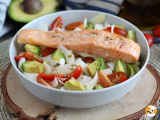If you're short of these vitamins in winter, here's how to remedy the situation!

In winter, viruses are circulating, morale is low and it's cold... Everything's done to make you ill, but how can you avoid the trap? To boost your immune system, there's nothing better than filling up on vitamins. Where to find them, how to consume them and in what quantities? From vitamin C and magnesium to iron, our bodies need to draw on all kinds of sources to maintain top health, and at holiday time, we need to stay in shape! Here are a few tips to help you find the vitamins you're missing :).
Fight fatigue
With the bitter cold blowing in, certain vitamins and minerals can save us - but which ones? Magnesium plays a key role in fatigue reduction, muscle relaxation and energy production. To fill up on magnesium, eat wholegrain cereals, legumes and cocoa, and drink certain mineral waters rich in magnesium. Iron, essential for oxygen transport in the blood, is found in meats, shellfish, legumes and dried fruit. To optimize your iron intake, combine it with foods rich in vitamin C. Finally, zinc supports the immune system and helps reduce fatigue by participating in carbohydrate metabolism. It is found in foods such as oysters, liver, meats and shellfish.
Vitamins B, C and D, our most faithful allies
These are the best-known vitamins, but perhaps the most useful in this cold. Vitamin C boosts the immune system by stimulating the production of white blood cells and fighting infection. It's found mainly in citrus fruits, kiwi fruit, peppers and cabbage. Tip: eat these foods fresh and raw to preserve all their benefits ;).
Vitamin D, essential for binding calcium and supporting immunity, is often deficient in winter due to reduced exposure to the sun. Oily fish, calf's liver and egg yolks are the best sources.
Finally, B vitamins, which help keep the nervous system in good working order, are found in wholemeal cereals, pulses, meat, fish and eggs, and can be supplemented by foods such as wheat germ or brewer's yeast.
Not insignificant extras
Fill up on omega-3s. They have anti-inflammatory properties, essential in winter to prevent seasonal depression and maintain good immunity. Oily fish, rapeseed and walnut oils, and flaxseed are all sources of omega-3. In case of deficiency or increased needs, dietary supplements in magnesium, iron, zinc, vitamin D or omega-3 may be considered, always under medical advice.
Other healthy recipes for your body :
 Mathieu Maggiore
Mathieu Maggiore

Comments